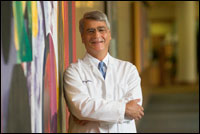

Exceeding expected survival rates"Neonatal heart transplants are a viable treatment option for congenital heart defects" |
|
|||||
|
For infants with complex congenital cardiac defects, the prognosis used to be bleak. Now, thanks to dramatic advances in heart transplantation, the outlook is more promising - as long as the infant is under the care of experienced transplant experts, such as the ones who are part of the Cleveland Clinic Children's Hospital Pediatric Heart Transplant Team. The proven track record of this world-class team is underscored by the fact that its tiny patients have a five-year post-transplant survival rate greater than 90 percent. When an infant is identified as a heart transplant candidate, the Cleveland Clinic team examines the infant and determines which pediatric specialists will be involved in the case. In accordance with Cleveland Clinic's unique group practice model (see accompanying sidebar), these experts work as a collaborative team that strives for the best possible care and outcome for each patient. Numerous specialists - including pediatric cardiologists, infectious disease specialists, neurologists, neonatologists, gastroenterologists and pulmonologists - extensively examine the infant to ensure that there are no contraindications to transplantation. As soon as a donor heart becomes available, surgery commences with the aid of a pediatric cardiac anesthesiologist. Post-surgery, the child is transferred to the Pediatric Intensive Care Unit, where highly-skilled pediatric intensivists, respiratory therapists and skilled critical care nurses are on duty. In addition, the PICU is staffed with board-certified pediatric intensivists 24 hours a day, 7 days a week, setting Cleveland Clinic Children's Hospital apart from other pediatric hospitals in the country. During the infant's recovery period, cardiac biopsies are performed to check the new heart's function and the child receives pediatric cardiac rehabilitation and pediatric physical therapy. Following a more complete recovery and returning to the home environment, the child is monitored monthly for rejection and infection. Due to lifetime risks of coronary artery disease, these patients continue to be observed by Cleveland Clinic specialists. Meanwhile, they have the opportunity to enjoy happy and healthy childhoods and adult lives.
|
||||||
Cleveland Clinic | Home | Agenda | Faculty




